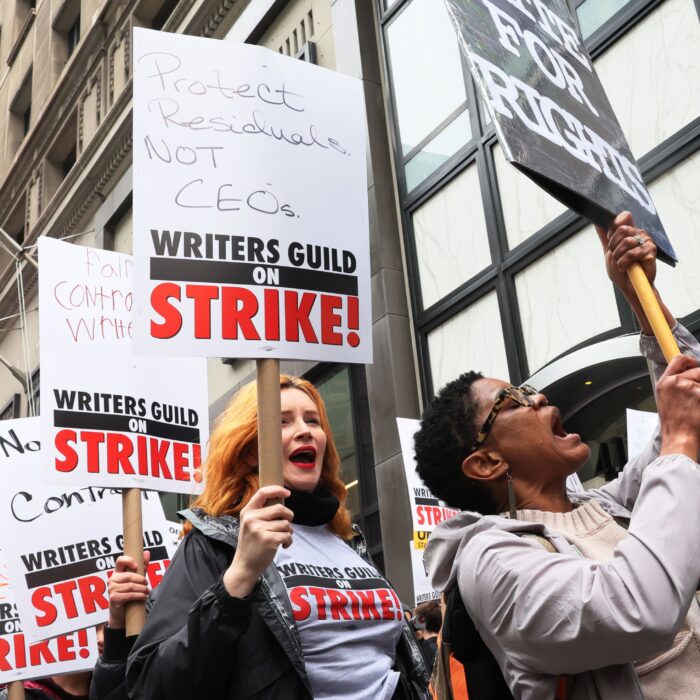The Writer’s Strike: An Introduction and Real Guild Writer’s Point of View
By: Kaya Miller
Everyone consumes something; we all need to survive, whether literally with food, water, and air, or figuratively, with some hobby/interest that entertains us when just ourselves won’t do. For some, music, and literature, is a needed outlet of relaxation. For the general public, visual entertainment, specifically film, and television, is consumed to get by. And this very vital part of human life is being impacted by Hollywood greed.
As introduced, television and film play a big part in many lives, acting as a form of escape from the realities of everyday life, a way to be informed better about the world; a way to laugh, learn, feel, and connect. The 11,000-plus writers involved in the WGA all contribute to whatever you seek from television, writing the stories, connecting the jokes, and building the foundation for whatever show/movie you have come to love. Yet, despite being the building blocks of such a large and impacting industry, these writers suffer countless attacks on their livelihoods. From the loss of reliable royalty payments, and creativity stifling to increasingly small contracts and threats of AI replacement, the Writers Guild of America (WGA) has become fed up with the treatments from studios and has decided to take action.
What started with the WGA negotiating for six weeks with the big-name studios/production companies (ex. Discovery-Warner, Disney, Netflix, Paramount, etc.) and their representation, the Alliance of Motion Picture and Television Producers (AMPTP), culminated in a strike against these studios, demanding more stable payment structures and more secure, worthwhile jobs. On May 2, 2023, the Writers Guild announced no member would write new scripts until the AMPTP agreed to terms and met enough demands to end the strike. It is not the first time the WGA has had to fight for better treatment (the 2008 strike), but with the new form the entertainment industry has taken, the fight has grown; with streaming services and AI writers being some of the biggest causes for concern of a writer in this modern production age, each creating its own sub-concerns.
Streaming is all about options, and options mean competition, something producers have prioritized over quality. The mass production of television and movies to accommodate all the competitors has created an environment where writers are not encouraged to think things through, build complex and moving stories, or even really get to finish a work they started; the budget in streaming being allocated less and less to writers, studios have started using mini-rooms, essentially bare-bones writing teams to make quick drafts of scripts, in order to pay less for writers and their ideas. The writers are then immediately discharged, replaced, or led on instead of staying with the script as it moves through production– that means conflicting stories between rewrites (if there are any at all) and a lack of creative risk as the writers know they are less likely to be able to build upon their ideas. Streaming also has cut down on income by revoking royalty checks/residuals. Although Hollywood writers have many options for making money, none pay well enough for it to be substantial with little work. Residuals were supposed to be a way to ensure a writer could live off their work without chasing jobs for quick bucks; when a writer got credited in something, and there was a rerun, the credited writers would get paid for it, something they could rely on in-between jobs. Now, shows on streaming services are not reruns making them “unworthy” of residual pay, thus lowering the already cut-down wages of writers that mostly write for streaming companies today.
Not only have producers stifled and demeaned writers’ creativity, they have threatened the already low job security through AI writers. Producers have begun looking into using AI writers to either finish prompts their mini writer teams come up with, and possibly write the scripts altogether. It is a clear representation of, as one WGA representative describes, “a commitment to further devaluing the profession of writing.” The studios would rather put out subpar content than pay for possible infringement claims, or just paying writers in general. While it is clear AI is still too primitive to create more watchable television for the standard of content many streaming platforms claim to hold themselves to, it does not stop advancements from being made, and cutting down on writers altogether.
This should be of concern for everyone, viewers and producers alike. Lower quality content lowers the value of the work created, losing the money-hungry producers all they are working for, and the viewers the choices they were supposed to be provided from this new system of entertainment. Everyone involved should want to step up the writer appreciation, as all they’re asking for is more livable wages, a more stable payment, and the ability to actually write, without the pressures to create quickly and with mass appeal– essentially to let the writers write and being properly compensated for what they do for the rest of their industry and those that consume its products.
But don’t just take it from me, listen to what the writers involved have to say themselves. I was lucky enough to connect with a writer for a late night comedy show on HBO who was able to provide insight on what these concerns are like from a direct perspective, as well as what the strike is. If you would like a more in-depth look at the strike and what it’s all about- the history, the goals, the impact, and the calls to action, scroll down to the bottom of the article for more information; I included references used in the article, and more reading you can do on your own. But for the sake of focusing on the voices of the writers themselves, read what this late night writer had to say.
Late Night HBO Writer:
What can you say about what you do for the show you work for? / How do you contribute to making it what viewers see at home?
I spend most of my time either outlining or drafting stories. Outlining involves combing through packets of research and pulling out the most relevant information, then reading transcripts of footage and choosing amusing video clips to illustrate that information — the outline is essentially just the beats of the story interspersed with video clips. Once the outline is approved, I start drafting, which basically means fleshing out the outline by adding jokes.
What is something you want people to know about your personal experience or the general behind the scenes writers endure?
At our show, the writers work on their own drafts separately. So the writing process is a pretty solitary experience. When you imagine a writers room at a comedy show, you probably picture a group of people sitting around a big table laughing and coming up with ideas together. But in my experience, comedy writing involves a lot more pacing around your apartment alone, mumbling to yourself in frustration while you try to come up with a joke.
How have you been impacted by the issues of the strike?
The strike-related issue that’s impacted me so far has been lower residual pay, which is the money we receive when episodes of our show get re-aired. Even in just the four and half years that I’ve been a writer, I’ve noticed that my residual checks have plummeted. Writers deserve to be compensated fairly when their work is being rewatched around the world. And right now, we’re simply not getting the compensation that we deserve.
What do you believe the strike really is, and what started it?
The simple answer to “what started the strike?” is corporate greed. The slightly more complicated answer is that wages for Hollywood writers have been falling as profits for streaming platforms have skyrocketed. There are a couple reasons for why wages are down. For starters, many writing jobs don’t last as long as they used to because streaming shows tend to have shorter seasons. So writers are often being hired for shorter periods of time. Meanwhile, residual payments (which is the money paid to writers when the movies and TV shows they’ve written get repackaged or re-aired) have practically evaporated thanks to the fact that streaming services pay fixed residuals that are not tied to viewer numbers. Basically, the studios are taking advantage of the transition to streaming to underpay writers.
How did you get involved in the strike?
This week, I joined a picket line in front of ABC studios. It’s a powerful feeling to advocate for yourself in such a public way, and I plan to be part of as many WGA pickets as possible.
What does the strike mean to you?
This strike is a reminder that there’s incredible solidarity among the workers in my industry. It demonstrates that we fight for each other by using our collective power to get what we deserve. And it makes me feel lucky to be part of such a powerful union.
Have your employer/non-writer coworkers been supportive?
They’ve been extremely supportive. Not only have they expressed their solidarity, they’ve also checked in on us to see how we’re doing personally. Being on strike can be an isolating experience, so it’s a great feeling when your bosses and coworkers reach out.
Do you think producers and other members of Hollywood will listen enough for it to really matter?
Yes, I believe we will win. The studios can’t make money without our writing. They need us. We have some powerful leverage here, and we’re not going to back down until we get what we deserve.
What do you personally hope to get out of this?
I hope that writing for film and television remains a viable career path in the future. We’re striking to improve pay and residuals, and ensure that, going forward, writers can afford to work in this industry. I love what I do, and I want to get to keep doing it.
How can people not part of the guild get involved/contribute in your opinion?
There are a number of ways that non-WGA members can get involved. Non-guild members are welcome and encouraged to join picket lines — you can follow the WGA East and WGA West on Twitter where they post the times and locations for picket lines. And if you don’t live near a picket location, you can support the strike by raising awareness online — by sharing news articles, using strike-related hashtags, and posting supportive messages on social media. Every bit of solidarity is helpful and very much appreciated.
References
Articles Used:
- Auguste Meyrat, “What the Writers Strike Means for Entertainment Today”
- Alissa Wilkinson, “Hollywood’s writers are on strike. Here’s why that matters”
General links to start learning:

